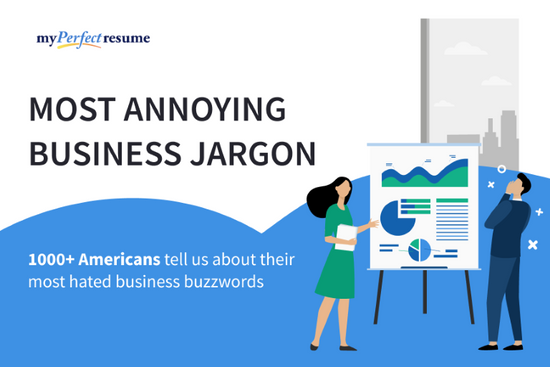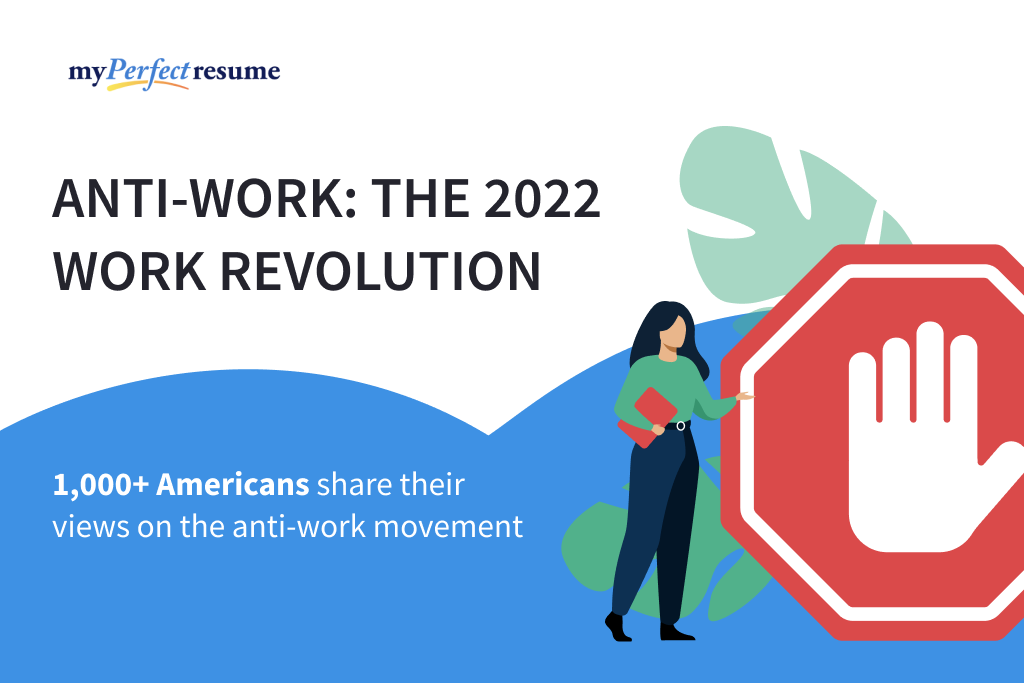Annoying Business Jargon [2021 Study]
MyPerfectResume.com [February 27, 2023],
[https://www.myperfectresume.com/career-center/careers/basics/annoying-business-jargon]

Our customers have been hired at: *Foot Note
While corporate jargon might seem like a useful shorthand or a means to be part of the team, too much of it can do more harm than good.
Below is a quick summary of the study’s key findings that give the why:
- Nearly 5 in 10 US workers find business jargon annoying or really annoying.
- Around 38% of employees feel pressured to use business jargon to fit in or appear competent.
- Another 41% report excessive use of business jargon leaves them feeling left out and disengaged.
- The most common party that uses workplace jargon is upper management, as 33% of Americans claimed.
Look, we’ve all done it.
Sometimes without realizing it, we’ve succumbed to the temptation to use corporate speak. Whether it was striving for architectural alignment on a company-wide scale, raising the bar by tapping into the power of bleeding-edge tech, or (the innocuous) circling back on an email, jargon thrives in the modern workplace.
Yet these buzzwords often veil our everyday interactions. They confuse, make everybody grit their teeth and clench their fists, and sometimes chip away at our professional image.
So, at MyPerfectResume, we’ve decided to poll 1,000+ Americans to discover the most cringe-worthy jargon terms in 2021 and what makes employees use them to help everyone grow a little more conscious of our language in business settings.
Keep scrolling to see some of the worst offenders.
America’s Most Annoying Business Buzzwords in 2021
The American workplace brims with buzzwords.
So, without further ado, below is a list of the top 10 most annoying business jargon phrases in 2021, according to our respondents, along with snappy definitions. Note that the percentages indicate the share of employees who find a given term annoying and/or particularly annoying.
- Giving 110%—59%—to give all you have, and then some.
- I’ll ping you—59%—to contact someone via computer or phone.
- Think outside the box—56%—to think creatively.
- Low-hanging fruit—54%—something you can obtain with little effort.
- Reinvent the wheel—53%—to duplicate a method that already exists.
- Synergy—52%—the combined value of two or more things will be greater than the sum of the separate individual parts.
- Take it to the next level—50%—to further improve something that’s already successful.
- Blue sky thinking—49%—brainstorming where ideas don't need to be grounded in reality.
- Bring to the table—49%—to provide something that will be a benefit.
- Touch base—49%—to make contact or reconnect with someone briefly.
Curious to know the least-hated jargon terms this year?
- Agile—29%—able to respond and adapt quickly to changes.
- Impact—32%—marked effect or influence.
- Robust—34%—able to perform well without breaking down.
- Gain traction—36%—when things are starting to move towards the desired goal.
- Deep dive—38%—to do an exhaustive analysis of something.
- Leverage—38%—to use.
- Vertical—38%—a group of companies/customers tied to a specific niche.
- Scalable—40%—able to grow without being hampered by its structure or available resources.
- On the same page—41%—to have the same kind of understanding as others.
- Lots of moving parts—41%—a complicated situation with many variables.
As you can see, the terms “Giving 110%” and “I’ll ping you” took the cake. So, you may want to go light on those two to avoid your colleagues blowing a fuse.
Make a resume with MyPerfectResume
Our Resume builder can help you write the perfect resume. Start Now!
Choose from professional resume templates designed by our team of experts.
Workplace vs. Corporate Lingo
Now—
Let’s “deep-dive” into the meat and potatoes of our study.
For starters, we wanted to ask if our respondents had ever used the above or other popular business buzzwords in their professional lives. A full 86% said “Yes”.
However, it was fascinating that nearly 40% of the survey takers didn’t know they were considered business jargon.
How come?
One of the respondents shared their thoughts with us:
How often do jargon phrases pop up, exactly?
- Sometimes: 57%
- Often: 24%
- Way too much: 10%
- Almost never: 10%
Here, we’ve also noticed that excessive “commercialese” is most commonly found in the Business and Finance industry, and it's least common in the Retail, Wholesale, and Distribution sectors.
Next, we asked Americans who they think particularly overuses these professional faux pas. Below is the breakdown of their responses:
- Upper management: 33%
- Colleagues: 30%
- Boss: 25%
- Me: 7%
- Direct reports: 5%
Somewhat predictably, “upper management” topped the list. After all, how could you possibly hold an all-hands meeting without mentioning “synergy” or “scalability” at least a few times? It makes you look more intelligent and/or professional, right?
Well, it sort of does, according to 57% of Americans in general. However, the other 43% of our respondents disagree—including 60% of workers with 20+ years in the workforce.
That said, there’s a scientific explanation for why people high in the org chart love jargon. A recent study found that it sometimes functions as a fancy title or an expensive watch (think Patek Philippe) that people use to show off to others or signal their social status. And social status brings influence and psychological well-being, another research work finds.
Moving along, we wanted to be somewhat blunt and ask working professionals what they generally think of the corporate lexicon.
It turns out that nearly 5 in 10 US workers find business jargon annoying or really annoying.
We then asked the respondents if they feel under pressure to use corporate speak at work to fit in or appear competent. Below are their responses:
- No: 62%
- Yes: 38%
Interestingly, we found that highly experienced employees are less likely to feel urged to use business jargon to fit in or appear competent, unlike their younger colleagues with 6–10 years in the workplace (84% vs. 35%).
As our penultimate question, we asked Americans if they had ever used workplace jargon terms whose meaning they didn’t know—33% said “Yes”. Similar studies on the topic also claim a substantial percentage of employees lack understanding of the jargon they use in their speech.
It’s important to note here that the vast majority of employees that don't have a college degree (89%) avoid using buzzwords whose meaning they don’t know. In contrast, only 62% of workers with a bachelor’s degree and 57% of those with a master's/doctorate follow suit.
On top of it, we found that the more years of experience employees have, the less likely they are to use jargon terms they don't know:
- 6–10 years: 55%
- 11–20 years: 27%
- 20+ years: 9%
Lastly, we asked working professionals if the excessive use of “corporatese” at work leaves them feeling left out and disengaged. For 41%, it was a resounding “Yes”. It makes sense: after all, jargon can make communication more difficult for outsiders and promote feelings of exclusion, a recent study finds.
When examining the data, we’ve also noticed that workers with a lot of professional experience under their belt (20+ years) are much less likely to report that excessive business jargon use leaves them left out or disengaged compared to their younger colleagues who are just starting in their careers (20% vs. 53%).
This study is a good reminder to leave the business jargon off of your resume, too. Instead, opt for powerful action verbs that convey your skills and qualifications without the use of jargon.
Methodology
We surveyed 1,087 unique respondents via a bespoke online polling tool. All respondents included in the study passed an attention-check question. The study was created through several steps of research, crowdsourcing, and surveying.
Limitations
The data we are presenting rely on self-reports from respondents. Each person who took our survey read and responded to each question without any research administration or interference. There are many potential issues with self-reported data like selective memory, telescoping, attribution, or exaggeration.
Some questions and responses have been rephrased or condensed for clarity and ease of understanding for readers. In some cases, the percentages presented may not add up to 100 percent; depending on the case, this is either due to rounding or due to responses of "neither/uncertain/unknown" not being presented.
Fair Use Statement
Don't miss the chance to share these findings–you might regret it! If you think your audience will be interested in this information, you can share it for noncommercial reuse. All we ask in return is that you link back to this page so that your readers can view the full study.
About Us
At MyPerfectResume, we know jobseekers struggle with the frustrations of navigating through annoying work jargon. Our mission is to help you communicate effectively and stand out in the job market. Explore our resume samples (written by certified professional resume writers), access our wide range of professional resume templates, and utilize our user-friendly online resume builder to craft a clear and impactful resume that cuts through the noise. Start your journey to career success today. We also recommend exploring our guide on how to write a resume tips from career advice experts.
How we reviewed this article
Since 2012, we have helped more than 11 million job seekers with our user-friendly tools and career advice articles. We have a rigorous editorial process to ensure that our content is helpful and accurate. Explore our recent employment studies and press coverage, and discover why our certified career experts are a trusted source for professionals worldwide.
Sources
- Anderso C., Hildreth J., Howland L., “Is the Desire for Status a Fundamental Human Motive?”
- Brown Z., Anicich E., Galinsky A., “Compensatory conspicuous communication: Low status increases jargon use”
- Jones N., “Talking the Talk: The Confusing, Conflicting And Contradictory Communica Y Communicative Role of Workpl Tive Role of Workplace Jargon in Modern Organizations”
- JS3 Global, “The UK’s Most Confusing Workplace Jargon”
- Locker K., “"As Per Your Request": A History of Business Jargon”
- Shulman H., “The Effects of Jargon on Processing Fluency, Self-Perceptions, and Scientific Engagement”
Our customers have been hired at:*Foot Note








